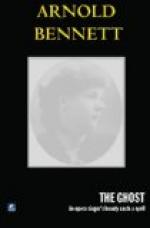The June sun shone gently radiant in a blue sky, and above the roofs milky-bosomed clouds were floating in a light wind. The town was bright, fresh, alert, as London can be during the season, and the joyousness of the busy streets echoed the joyousness of my heart (for I had already, with the elasticity of my years, recovered from the reverse inflicted on me by Keith Prowse’s clerk). On the opposite side of the street were the rich premises of a well-known theatrical club, whose weekly entertainments had recently acquired fame. I was, I recollect, proud of knowing the identity of the building—it was one of the few things I did know in London—and I was observing with interest the wondrous livery of the two menials motionless behind the glass of its portals, when a tandem equipage drew up in front of the pile, and the menials darted out, in their white gloves, to prove that they were alive and to justify their existence.
It was an amazingly complete turnout, and it well deserved all the attention it attracted, which was considerable. The horses were capricious, highly polished grays, perhaps a trifle undersized, but with such an action as is not to be bought for less than twenty-five guineas a hoof; the harness was silver-mounted; the dog-cart itself a creation of beauty and nice poise; the groom a pink and priceless perfection. But the crown and summit of the work was the driver—a youngish gentleman who, from the gloss of his peculiarly shaped collar to the buttons of his diminutive boots, exuded an atmosphere of expense. His gloves, his scarf-pin, his watch-chain, his mustache, his eye-glass, the crease in his nether garments, the cut of his coat-tails, the curves of his hat—all uttered with one accord the final word of fashion, left nothing else to be said. The correctness of Keith Prowse’s clerk was as naught to his correctness. He looked as if he had emerged immaculate from the outfitter’s boudoir, an achievement the pride of Bond Street.
As this marvellous creature stood up and prepared to alight from the vehicle, he chanced to turn his eye-glass in my direction. He scanned me carelessly, glanced away, and scanned me again with a less detached stare. And I, on my part, felt the awakening of a memory.
“That’s my cousin Sullivan,” I said to myself. “I wonder if he wants to be friends.”
Our eyes coquetted. I put one foot into the roadway, withdrew it, restored it to the roadway, and then crossed the street.
It was indeed the celebrated Sullivan Smith, composer of those so successful musical comedies, “The Japanese Cat,” “The Arabian Girl,” and “My Queen.” And he condescended to recognize me! His gestures indicated, in fact, a warm desire to be cousinly. I reached him. The moment was historic. While the groom held the wheeler’s head, and the twin menials assisted with dignified inactivity, we shook hands.
“How long is it?” he said.
“Fifteen years—about,” I answered, feeling deliciously old.




